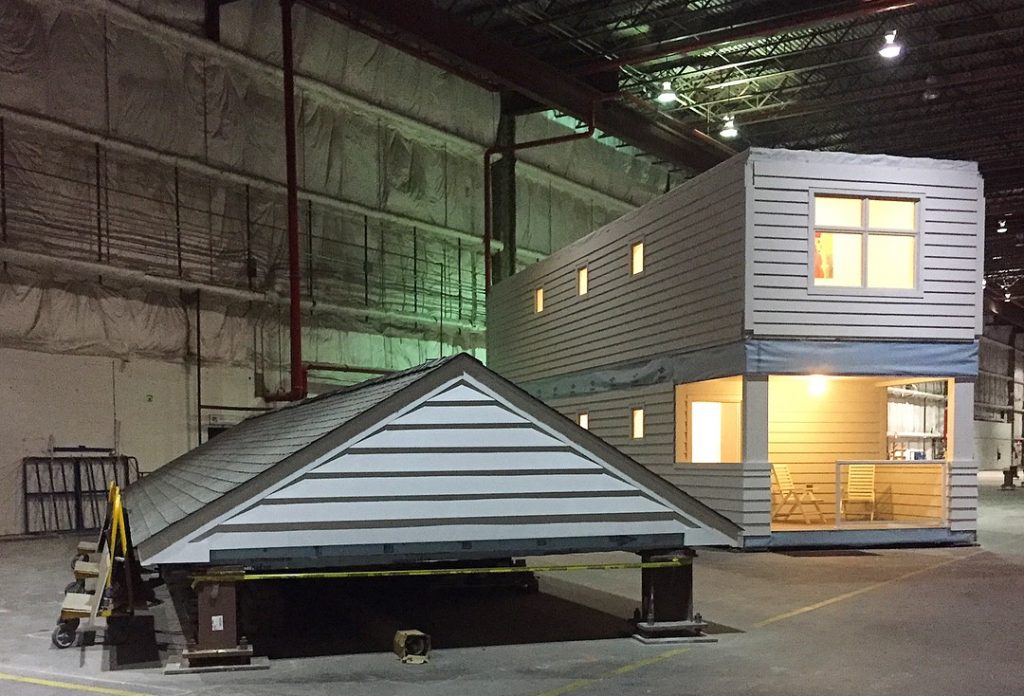City Seeks Developers To Build Net-Zero-Energy Homes
Two test homes would be built as part of strategy to develop a housing factory.

House assembly within a factory. Robinproll, CC BY-SA 4.0, via Wikimedia Commons
Thousands of Milwaukee residents’ next homes could be environmentally friendly, affordable and factory-made under a plan from the city’s Environmental Collaboration Office (ECO) and the nonprofit Community Development Alliance (CDA).
Together they are pursuing a two-home proof of concept in the Lindsay Heights neighborhood.
ECO is offering $500,000 for a development team to construct the houses as a trial for a much larger vision to create a factory capable of producing modular, environmentally-friendly houses. Funded by a federal grant, the effort aims to start with a 1,200-square-foot single-family home and a 2,400-square-foot duplex. Both must be developed using off-site construction techniques and sold to low-income owner-occupants. Solicitation for partners is underway through a request for proposals (RFP).
An additional $325,000 would be awarded to a manufacturer to establish an operation in Milwaukee. In first discussing the concept in 2021, ECO director Erick Shambarger said his office envisions such a facility opening in the Century City business park and serving as a source of new construction jobs and affordable, sustainable housing.
“The financing plan is premised on the assumption that once a factory is operating at scale, new single-family homes can be built for approximately $220,000.00 each and sold to homeowners at about $125,000.00 each with gap financing provided through a variety of sources as outlined in the plan,” says the RFP.
Filling the gap between construction and sale costs has been the primary role of the CDA across a number of its initiatives. Driven by a 2021 report and plan that identified substantial racial and economic disparities with Milwaukee’s housing supply, the CDA is working to drastically increase the number of affordable homes for lower-income owners and renters. The RFP says the ECO housing project could gain future financial support via federal New Market Tax Credits and Inflation Reduction act programs.
Working with the CDA, a housing manufacturer would be expected to provide between 20 and 100 units per year.
The RFP makes it clear the city doesn’t want to see trailer homes. “These are not HUD-classified manufactured homes built on a chassis, but rather high-performance, energy-efficient homes built off-site and assembled on permanent foundations, such as basements, helical piers, or slab-on-grade. For Phase 1, the prefabricated components built off-site do not have to be built in the City of Milwaukee. The homes need to comply with all applicable residential building codes and exceed code relative to energy efficiency,” says the RFP.
Development teams are to have the two houses ready for sale by October 2024. An additional $24,000 grant would be available to make aesthetic exterior repairs or energy efficiency improvements to houses on the same block as part of a strategy to build neighborhood support.
The new houses need to be built within a Qualified Census Tract, wherein at least 50% of households have an income less than 60% of the area’s median gross income or the tract has a poverty rate of at least 25%. “In Milwaukee, Qualified Census Tracts are located in predominately Black and Hispanic neighborhoods, where the energy burden is roughly double that of households in predominantly white neighborhoods,” says the RFP, meaning those households pay twice as much as others for heat and electricity as a percent of their income.
Working with the Department of City Development, ECO identified two vacant lots where it intends the homes to be built: 2456 N. 19th St. and 2458-2460 N. 19th St. Located in the Lindsay Heights neighborhood, the lots are immediately east of the recently redeveloped Phillis Wheatley School. In 2018, Lindsay Heights was designated the city’s first Eco neighborhood. Substitute lots could be provided if those properties are found to be unworkable. As part of the larger program, the city would sell lots to the development team for $1 each.
The RFP calls for each house, at minimum, to comply with the U.S. Department of Energy‘s Zero Energy Ready Home Program. Electric heat pumps would take the place of a gas furnace and solar panels would provide power. “The energy goal for this project is to build houses that have net-zero energy use over the course of a year,” says the RFP.
RFP responses are due April 18. The contract is expected to be awarded in late May, with a May 2024 construction start. A housing factory is expected to be under lease by September 2024.
The Common Council allocated $1 million from the city’s $394.2 million American Rescue Plan Act grant to support the project. In 2021, ECO also secured a $25,000 grant from the Environmental Protection Agency and used it to develop a Net-Zero home financing plan. ECO, which was turned onto the idea by the city-county climate task force, issued a request for information from possible vendors in 2021; seven responded.
The CDA helped start an acquisition fund with Acts Housing and is also guiding the effort to develop 120 homes on vacant lots in the area around King Park.
A copy of the RFP and associated documents are available on the city’s Bonfire bidding portal.
If you think stories like this are important, become a member of Urban Milwaukee and help support real, independent journalism. Plus you get some cool added benefits.
Eyes on Milwaukee
-
Church, Cupid Partner On Affordable Housing
 Dec 4th, 2023 by Jeramey Jannene
Dec 4th, 2023 by Jeramey Jannene
-
Downtown Building Sells For Nearly Twice Its Assessed Value
 Nov 12th, 2023 by Jeramey Jannene
Nov 12th, 2023 by Jeramey Jannene
-
Immigration Office Moving To 310W Building
 Oct 25th, 2023 by Jeramey Jannene
Oct 25th, 2023 by Jeramey Jannene





















